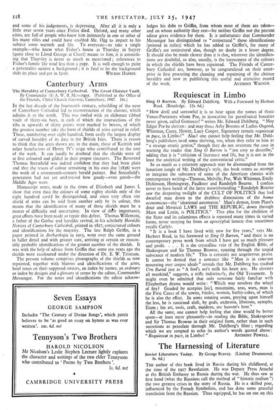The Functions of Background
MR. 0:3G is primarily a historian, and history and biography are not identical. Mr. Ogg begins by stating that Dr. Fisher was born in 1865. He then adds that "in the annals of the nineteenth century the year 1865 is notable," and proceeds to enlarge for some six and a half pages on the personalities and trends of thought that made it notable ; what effect they had on the infant lying in his cradle at 3 Onslow Square, S.W.7, is a matter for speculation ; the trends of 188o when the boy of fifteen at Winchester was beginning to react to the tides of life about him might be thought to be more relevant. In 1884 Fisher got to Oxford and Mr. Ogg traces the history of New College and discusses the college system generally. The chapter on " The Oxford Don " (1889-1912) is good biography, and so is the brief account of the next brief interlude, the Vice-Chancellorship of Sheffield (1912-1916). The chapter on the Education Bill of 1918 begins well with a discussion of Fisher's qualifications for the post of President of the Board of Education. Then Mr. Ogg remarks that " at this point a reference may be permitted to some traditions in the earlier development of education in England," the reference being in fact an eleven-page summary of the whole history of English education. The thirteen pages devoted to the Bill itself are on " measures, not men " lines, discussion and analysis of the Bill over- shadowing lamentably (as so often in this volume) the personality of the Minister who sponsored it.
The chapter on Fisher as Cabinet Minister is again conspicuous for its lack of any intimate touch, and many of Mr. Ogg's judgements on the•Ministers of the 1919 Cabinet would' be sharply challenged by anyone who knew them personally. To describe Mr. Balfour as "enigmatic and elusive, occasionally exercising a waspish wit which obliged the victim to search for the place where the sting would be felt " is to concentrate on one largely legendary aspect of that many- sided personality ; and to suggest that Mr. Balfour " regarded the progress of mankind as from one Ice Age to another and may welt have considered the League of Nations an elegant milestone in that inevitable but dispiriting pilgrimage " is to compel the conclusion that Balfour's frequent and earnest declarations of faith in the League were mere cynical hypocrisy. Mr. Ogg himself has no opinion of the League or of many of its supporters. He dilates at some length against the Peace Ballot of 1935, with which Fisher warmly identified himself, and he nowhere mentions the self-sacri- ficing assiduity with which Fisher for years attended the weekly meetings of the executive committee of the League of Nations Union ; the Union indeed has no place in Mr. Ogg's index.
With Fisher's election to the Wardenship of New College in 1925, Mr. Ogg, who is a Fellow of New College himself, is on firmer ground, and this chapter, covering many activities which the Warden combined with his college duties—notably important speaking tours in America and service on the Governing Body of the B.B.C.- is the best in the book. The chapter on the work by which Fisher will be longest remembered, The History of Europe, is of a different order. Mr. Ogg is a historian himself, and in these 37 pages (a sub- stantial proportion of a total of zoo) he gives evidence of finding the writing of history a more congenial subject than a writer of history. His not infrequent " it is necessary to refer to " is usually an ominous prelude to some protracted digression, which, however inherently interesting, has the effect of relegating the subject of the volume summarily to the wings. It is found necessary to consider Ranke at length in order to decide whether Fisher was of his school, and Acton at greater length and in more detail for the same purpose. The generaleffect, in spite of some suggestive criticism of Fisher's method
and some of his judgements, is depressing. After all it is only a little over seven years since Fisher died. Oxford, and many other cities, are full of people who knew him intimately in one or other of his many roles and could have enabled Mr. Ogg to impart to his subject some warmth and life. To everyone—to take a single example—who knew what Fisher's house at Thursley in Surrey (quite close to Lloyd George at Churt) meant to him, it is astonish- ing that Thursley is never so much as mentioned ; references to Fisher's family life total less than a page. It is well enough to paint a personality against a background ; it is fatal to let the background



































 Previous page
Previous page